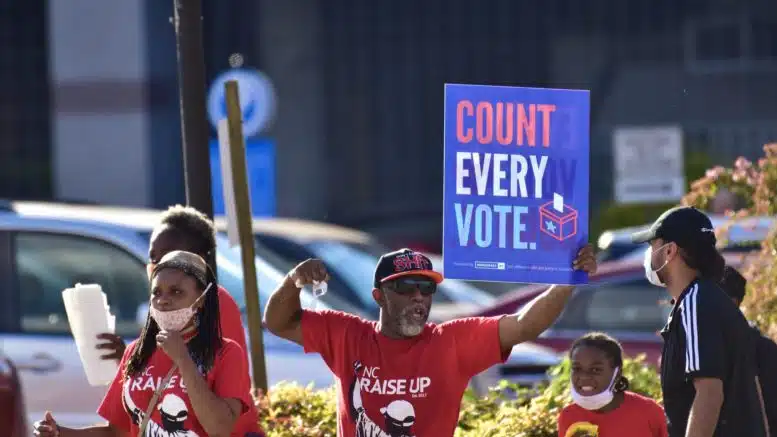By Anne Blythe
Many people across North Carolina are heading to the polls to vote early for municipal elections. Others are deciding to wait until the Nov. 7 election day to cast ballots in local elections for mayors, city councillors and school board members.
Only 12 counties have no elections this year, according to a North Carolina State Board of Elections map. For the other 88 counties, it could be a test run for a new voter ID requirement and changes to the voting process and elections law approved by the Republican-led General Assembly earlier this month.
Democratic Gov. Roy Cooper vetoed the bill initially, but lawmakers returned to Raleigh earlier this month to override his veto in votes that fell along party lines.
Many of the new requirements trouble Rep. Diamond Staton-Williams, a Black Democrat from Concord, but one in particular led her to talk about her 86-year-old grandmother during a recent debate.
A new provision requires precinct officials to maintain a log of anyone who enters a polling place who is not seeking to vote, but perhaps escorting an older or disabled voter. The log is to include the name, address and signature of that person unless they are a child younger than 18 in the care of the voter.
Staton-Williams said she worries such a provision will have a chilling effect on people who help get older and disabled voters to the polls — especially when the country is so politically divided.
After the 2020 presidential election, poll workers and election officials found themselves targeted by a maelstrom of election deniers on social media platforms and — in extreme cases — outside their homes and offices.
“I think this just gives the ability for people to be harassed,” Staton-Williams said in a recent phone interview with NC Health News. “It sounds like they want to police these people.”
‘Why do you need my name?’
Staton-Williams’ grandmother, Margaret Gainey Staton, has been a fervent voter for most of her adult life. She has regaled her children and grandchildren with poignant stories of the civil rights fights in the 1960s to do away with discriminatory voting practices and stressed the importance of education and the power of their vote.
“If I didn’t hear anything else, it was, ‘You need to go to school, you need to go vote,’” Staton-Williams recalled.
So when lawmakers gathered in the House chambers on Oct. 10 to decide whether to overturn Gov. Roy Cooper’s veto of election law changes that would now require anyone taking Staton-Williams’ grandmother to her polling place in Charlotte to sign into a log, the freshman representative rose from her seat to relay her concerns.
Staton-Williams had asked for a moment of personal privilege from House Speaker Tim Moore, a Republican from Kings Mountain, two weeks before that to wish her grandmother a happy 86th birthday.
Then two days after her birthday, her grandmother had broken her ankle and would need help getting to the polls to vote.
Although Staton-Williams and her aunts, uncles and cousins would make sure their beloved elder was taken to vote, she worried that others who either had injuries, had given up driving or needed other kinds of help would not have as supportive a team around them.
“Just think about how many people will be like, ‘Why do you need my name?’” Staton-Williams said.
‘Environment of fear’
Republicans have batted back contentions that the election law changes are designed to make it more difficult to vote for people of color and communities that often vote Democratic. They argue that the changes are designed to give the public more faith in elections and their outcomes.
Corye Dunn, director of public policy for Disability Rights North Carolina, has concerns similar to Staton-Williams about requiring people to sign a log if they are only inside the polling place to help someone get to and from the polls.
“There is a real environment of fear,” Dunn said. “We know that there have been people, from election administrations to voters, who have experienced harassment or negative media attention for doing nothing wrong.”
In 2016, after Cooper narrowly defeated Republican Pat McCrory in the governor’s race, hundreds of protests were filed against voters across North Carolina by Republicans in dozens of counties, accusing people of voting in two states, casting ballots as felons and other fraudulent activity — claims that were largely unfounded.
Still, those voters’ names were publicized and attached to negative storylines that remain fresh in the minds of many.
Now lawmakers want poll visitors to add their names and signatures to a document that could be misused, say advocates for older and disabled voters.
“I do think that it raises the specter in folks’ minds that they will be bothered somewhere down the road,” Dunn said.
Many people who live in adult care homes and other facilities — Democrats, Republicans and unaffiliated voters — already have difficulties securing transportation and having control over their schedules.
“Making sure those folks have an opportunity to vote if they want to is already a heavy lift,” Dunn said. “The idea that you might later be questioned, it’s an additional burden placed on voters with disabilities.”
Lots of change to monitor
Chris Brandenburg, associate state director of advocacy for AARP in North Carolina, says his organization is working to make sure voters in the 50-plus age group can be easily informed in 2024 about all the election law changes and new districts being drawn for congressional districts and state House and Senate seats.
“We’re monitoring a lot of changes,” Brandenburg told NC Health News in a phone interview. “We want to get accurate and truthful information to our voters.”
Many older voters mail in ballots instead of going to the polls. Lawmakers did away with the three-day grace period that had been allowed for more than a decade to count mail-in ballots postmarked by Election Day.
Republicans had wanted to use signature software to verify every mail-in ballot, but Democrats persuaded their colleagues on the other side of the political aisle to launch a pilot program in 10 counties that starts next year.
Over time, handwriting can change, advocates for older voters and people with disabilities say. That can apply to people outside those populations as well, they add.
“We are going to be keeping a close eye on that pilot program,” Dunn said.
Many also will be watching how the new voter ID requirement works during this municipal election year to help inform voters in 2024, when the polling places are likely to draw many more voters for the presidential and other state elections.
Sign up for our Newsletter
“*” indicates required fields
“We’re making the laws for the people in the room, and we’re not thinking about the consequences,” Rep. Alison Dahle, (D-Raleigh), said before voting against the proposal to overturn Cooper’s veto of the election law.
Dahle shared a story about her mother, who lives in Fuquay Varina, and broke her hip. “She’s been bothering me for two months to make sure I’m going to take her to vote,” Dahle said, noting that her mother is talking about the 2024 elections.
“You’ve got to start thinking about the people in North Carolina, not just us,” Dahle added.
Republicans contend they have been thinking about North Carolinians.
“These are common-sense reforms that restore faith in our elections,” Sen. Warren Daniel, a Republican from Morganton, and Sen. Paul Newton, a Mt. Pleasant Republican, said in a joint statement after the veto override on Oct. 10.














